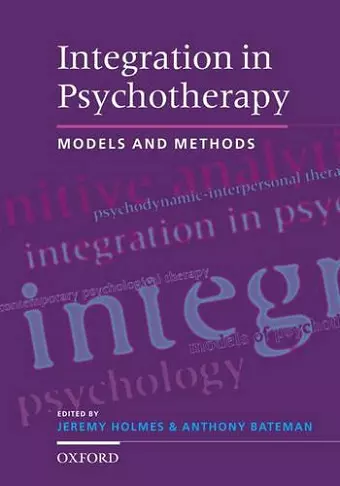Integration in Psychotherapy
Models and Methods
Jeremy Holmes editor Anthony Bateman editor
Format:Paperback
Publisher:Oxford University Press
Published:10th Jan '02
Currently unavailable, and unfortunately no date known when it will be back

Entered for the Society of Authors and the Royal Society of Medicine Medical Book Awards 2002
Expounds the integrative currents in psychotherapy as they impact on the spectrum of contemporary psychological therapy. The contributors look at the links between their own approaches and those of others, as well as covering traditional approaches and exploring new modalities in the field.Psychotherapy is growing and changing rapidly and much of this development is integrative in nature. Integration in psychotherapy can mean many things from the sequential or simultaneous use of different established techniques, through the adoption of specific hybrid therapies, to the flexibility which is found in the practice of mature clinicians, who often adopt techniques or theory borrowed from other disciplines. This book explores and expounds upon these integrative currents as they impact on the spectrum of contemporary psychological therapy. In section one, leading practitioners from within traditional models of psychotherapy, self-critically look outwards towards the limits and links between their own approaches and those of others. Section two provides a showcase for the cutting edge new modalities in psychological therapy (Cognitive analytic therapy, Psychodynamic-interpersonal therapy, etc), as well as covering traditional approaches which are inherently integrative. Throughout, the editors and authors strive to maintain a balanced approach, considering the strengths and weaknesses of the integrative stance. Bateman and Holmes are experts in this field and have been at the forefront of the integrative agenda, they have assembled a group of distinguished chapter authors to help them in their exploration of these issues.
. . . this book . . . gets one to think about similiarity and difference of models: between theory and what actually happens in the consulting room; between models in which one has a deep personal investment; and others which one may have consciously or unconsciously denigrated. In relatively few pages, the book conveys the essence of a number of different therapies, and focuses our minds on practical and conceptual similiarities and differences between paradigms. Like other books which are worth reading, it provides new insights, raises (sometimes uncomfortable) questions, and stimulates further reading. * Psychoanalytic Psychotherapy, Volume 17, No 2 *
This short book is edited by two of the currently best-known UK psychotherapists, who have a deserved reputation for writing clearly and persuasively about psychotherapy. * Mental Health *
This book does succeed on a number of levels. It gets one to think about similarity and difference of models: between theory and what actually happens in the consulting room; between models in which one has a deep personal investment; and others which one may have consciously or unconsciously denigrated. In relatively few pages, the book conveys the essence of a number of different therapies, and focuses our minds on practical and conceptual similarities and differences between paradigms. Like other books which are worth reading, it provides new insights, raises (sometimes uncomfortable) questions, and stimulates further reading. * Psychoanalytic Psychotherapy, Vol 17, No 2 *
ISBN: 9780192632371
Dimensions: 240mm x 168mm x 12mm
Weight: 372g
222 pages